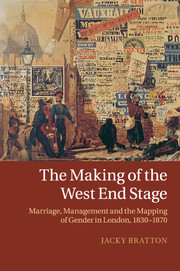 The Making of the West End Stage
The Making of the West End Stage Introduction
Published online by Cambridge University Press: 05 November 2011
Summary
Introducing a volume of the diaries of a minor dramatist, the Victorian critic Clement Scott speaks of them as a bridge ‘over the blank period of unwritten history between Macready and Henry Irving’. It is now generally agreed that the years from 1840 to 1870, roughly the same span, saw the emergence of the West End; but the period remains almost as unmapped as it was when Scott threw his first rope of reminiscences across the chasm. In 2000 Tracy C. Davis provided a massive and challenging incitement to new work on the whole century, in her Economics of the British Stage 1800–1914; but there are still very few works exploring the foundation of the West End. This book, taking something of its title and its focus from Maggie Gale's West End Women: Women and the London Stage 1918–1962, is therefore setting out upon a new and untold history. Perhaps Scott's image of a bridge, offering to link two high places, suggests a reason for the continued neglect of the early and mid Victorian theatre: it carries the implication that what lies between is a gulf, dark and low and not worth visiting. A few pathways through the undergrowth have been traced, mostly using Shakespeare as a guiding light; and they suggest that this was indeed a space of savagery and darkness. It is the ambition of this book to counter that perception. My intention is not to offer another way of negotiating, getting over, the mid-Victorian theatre, but to make an open-eyed and appreciative foray into its centre; to attempt to suggest a different way of seeing, that does not picture the formation of the West End as an unfortunate pitfall in the development of theatrical art.
The new West End
The first question that presents itself is why such a ‘blank period’ in theatre history should be supposed to have occurred during the most eventful and vigorous years of Victoria's reign: the received understanding that theatre-going was an unimportant and unfashionable pursuit during these decades is not an answer but a restatement of the question. During these years London was rebuilt as the global metropolis, the unchallenged centre of the western world; and this meant huge physical and psychological changes. According to its most recent historian, ‘[t]he 1860s were the most destructive and the most creative decade in the City's history in the 200 years since the Great Fire’, when runaway new building and the urgent necessity for new highways, transport, drainage and lighting to serve it made old London an unceasing chaos, a maze of hoardings, actual bridges – the viaducts of the new railways – deep excavations, broken-off streets, raw demolition and chaotic redevelopment. In the midst of this there were, it would appear, many people eager to be amused and to have their understanding of the world around them shaped by the interpretations of performance: every picture we have of London's ubiquitous hoardings in these years shows them plastered with brilliant and busy posters advertising plays, shows, exhibitions and performances of all kinds (see cover illustration). Already in 1800 this was the largest city in the world; by 1851 it had become a dense mass of more than 2.3 million people, with tens of thousands more within frequent visiting range by train. By 1841 a third of the residents had not been born in the city; and the large majority of them were young. 136,000 houses in 1801 had become 306,000 by 1851. Here was the biggest, most exciting audience in the world.
Information
- Type
- Chapter
- Information
- The Making of the West End StageMarriage, Management and the Mapping of Gender in London, 1830–1870, pp. 1 - 14Publisher: Cambridge University PressPrint publication year: 2011